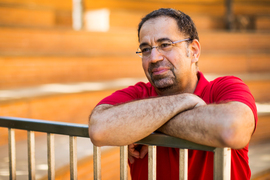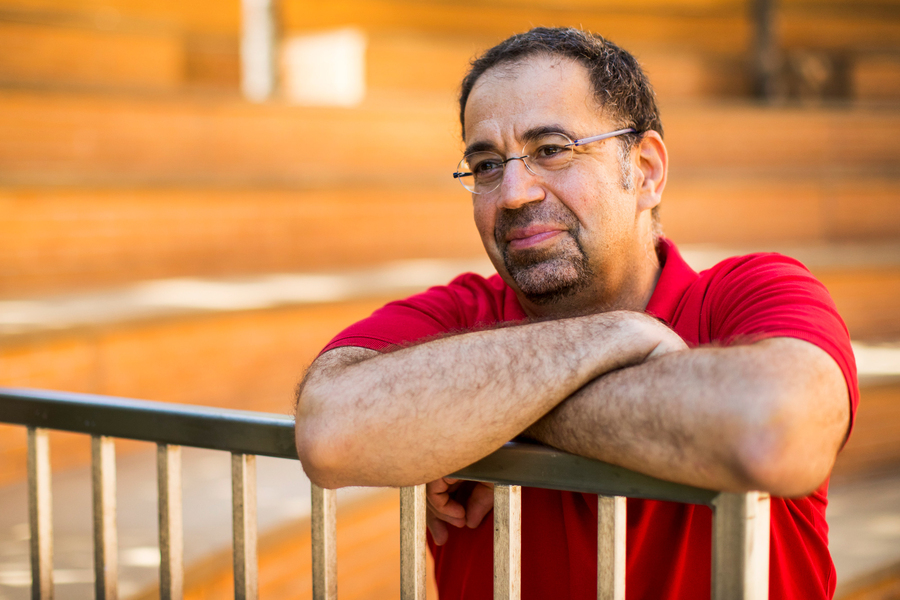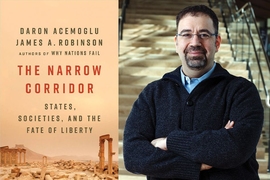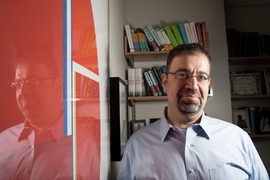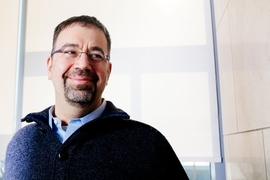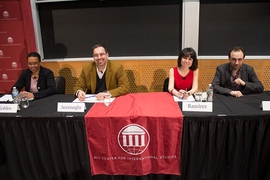Two stunning events on Jan. 6 — rioters invading the U.S. Capitol, and roughly 140 GOP members of Congress voting not to certify the presidential election results in certain states — have intensified national concern about the future of American democracy.
To extend the discussion, MIT News spoke with MIT economist and Institute Professor Daron Acemoglu, who has written extensively about democratic institutions, political dynamics, and the way democracy increases economic growth. Acemoglu’s most recent book, “The Narrow Corridor,” co-authored with James Robinson of the University of Chicago and published by Penguin Random House in 2019, contends that we overestimate the supposedly “brilliant design” of the U.S. Constitution as a bulwark against antidemocratic forces. Instead, rights and liberties in the U.S. have depended upon “society’s mobilization … at every turn” throughout our history.
Indeed, Acemoglu asserts, while a state can protect weaker citizens within society, we must also work to limit the power of the state. Liberty and democracy thus exist in a “narrow corridor” between lawnessness or authoritarianism; social action is needed to protect liberty when the state starts to discard the rule of law. We asked Acemoglu to reflect upon U.S. events through this framework.
Q: You have said in the past that democracy-based liberty in the U.S. has a “much more troubled and contingent existence” than we might like to imagine. What is your evaluation of the condition of U.S. democracy in light of this month’s events?
A: My take is that the events of Jan. 6 are nothing surprising, and they’re not really a change in the trend that we have experienced. I think we have been in a very dangerous situation for the last four years. Of course Trump’s election itself is not something that came out of nowhere. But focusing on the last four years, Trump has continuously weakened U.S. institutions, polarized the country, and destroyed political norms that were unfortunately already weak. So it has been a rocky ride for U.S. democracy, and one of the most pernicious weapons that Trump has had has been the use of social media to appeal especially to a group of fairly extremist and even prone-to-violence supporters.
We’ve seen this play out, in slow motion and then accelerated form, over the last four years. I don’t find what happened in January 2021 surprising, and I would be shocked if anybody is shocked after what we’ve experienced.
I am also very opposed to the narrative that the events of Jan. 6 prove U.S. institutions work because we’ve come back from the brink. Everybody should be concerned that this is not an isolated event, and the next one could be much more damaging. I think the only good thing that has come out is that hopefully people are becoming a little bit better informed, and recognizing that a broad reassessment of where we are is necessary. Trump will not be the last American populist, and the next one may be much more dangerous, so we really have to rethink our institutional safeguards and the foundational issues that have brought us here.
Q: What are the main actions that are needed for the U.S. to stay in what you have termed the “narrow corridor” in which political liberty is possible?
A: My view is that the four years of Trump would have been even more damaging if people had not taken action. From the first day, there were civil society actions against Trump, and the media has been the disinfecting sunlight on Trump’s corruption and all sorts of unethical behavior. So I think we really owe the survival of our democracy to that sort of civil society action.
But of course the question is: How can we rebuild our institutions? And my analysis of history suggests that when things become very polarized, very zero-sum inside the narrow corridor, we have a lot of instability. There are economic problems that we have to tackle — creating shared prosperity would help a lot, and during economically hard times, politics becomes more polarized. There are a lot of challenges ahead, and none of them are easy. But we cannot afford to waste any time to get started on them.
Q: To what extent is the U.S. part of a global trend toward illiberalism — or conversely, how much are its politics unique?
A: Every country, just like Tolstoy’s unhappy families, is living this crisis differently, but of course, it cannot help but strike one that there are many parallels between what’s happening in Brazil, Turkey, Hungary, Poland, the U.S., and to some degree even the U.K. I don’t believe social science has generated a very good explanation for why so many disparate countries are going in the same direction. So I don’t pretend to know the answer.
What’s common about these economies is they’re all having a very hard time creating a model of shared prosperity, and they’re all being affected by globalization, in the cultural sense as well as economically. Nationalism is on the rise, and what the reasons for that are I don’t know, but discontent among lower-and middle-income people, along with nationalism, creates a pretty good breeding ground for right-wing populism.
All kinds of autocrats have worked out how to exploit media, especially social media, and seem to have a better playbook for weakening democratic participation and checks and controls at the moment. But we have seen in the U.S. that people who were worried about Trump’s destructive impact did protest against him, created a lot of pressure, and turned out in the midterm and presidential elections. I wouldn’t take that as comfort that we’re going to be okay, but I wouldn’t say that nobody wants to defend democracy, either.
